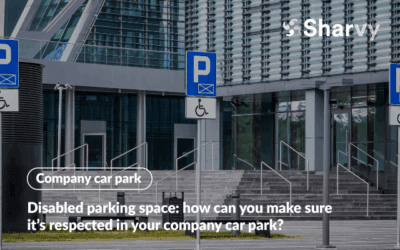Are you thinking of installing charging points in your company car park? But do you have a precise idea of the cost involved?
Faced with legal obligations in the UK and the boom in electric vehicles, many companies are turning to the installation of Electric Vehicle Supply Equipment (EVSE) to meet the growing needs of their employees and customers.
However, this investment requires a rigorous assessment, because the costs associated with such an installation are not limited solely to the purchase of charging stations.
Between the costs of installation, operation and maintenance, and any financial aid available, it’s essential to understand all the financial elements before taking the plunge! In this article, you’ll find details of these costs to help you understand this strategic investment.
What is an Electric Vehicle Supply Equipment (EVSE)?
An Electric Vehicle Supply Equipment (EVSE) is, quite simply, all the equipment needed to charge electric vehicles.
It consists mainly of charging stations, which vary in power and functionality, as well as the equipment needed to connect them to the electricity grid, such as wiring, meters and safety devices.
Since 1er June 2022, all new non-residential buildings with more than 10 parking spaces must have at least one charging point and cable trays for one in five (20%) of the total spaces. At the same time, all non-residential buildings undergoing major renovation with more than ten parking spaces must also have at least one charging point and cable trays for one in five spaces.
The aim of these provisions is to accelerate the adoption of electric mobility by facilitating access to suitable infrastructure, while helping to reduce greenhouse gas emissions.
So, what are the initial costs of installing an EVSE in a company car park?
Obviously, these costs vary according to several factors: the type of bollard, the power required & the complexity of the installation. Below, you’ll find an estimate of the main costs your business needs to anticipate.
1. The cost of charging points in your company car park.
- Standard charging stations (3.7kW to 7kW): a solution suited to corporate fleets and to the needs of employees who park for several hours. They provide a full charge for an electric vehicle during a working day (8 hours on average), which is suitable for users who do not need to recharge immediately. They cost between €1,000 and €2,500 per charging point.
- Accelerated charging stations (11kW to 22kW): these are ideal for faster vehicle rotation, allowing vehicles to be recharged in just a few hours. This makes them ideal for companies with active fleets and mobile employees. A 22kW charging point, for example, can recharge a vehicle up to 80% in less than two hours. They cost between €3,000 and €5,000 per charging point, which represents a higher investment than standard charging points, but is justified by the greater efficiency and shorter recharging times.
- Fast-charging stations (50kW and over): these are mainly used in areas where fast charging is required, such as motorway service areas & certain public charging stations with high footfall. They are capable of recharging a vehicle in less than an hour, or even in 30 minutes for certain models. Costs can range from €10,000 to €50,000 per station, or even more for very high-powered systems.
Depending on usage, the type of fleet and the target clientele, each company will have to choose the type of charging point best suited to its needs, taking into account installation costs and the impact on vehicle management.
2. The cost of installing charging points.
Obviously, these costs vary depending on the configuration of your company car park, and in particular, the distance between the installation of your EVSE & the power supply source.
For a standard installation, wiring and connection costs generally vary between €500 and €2,000 per terminal. This amount may increase if roadworks are required, such as piercing the road or adding underground conduits, to ensure an adequate & secure connection to the electricity network.
In addition, bringing the company’s electrical network into compliance and installing specific equipment can also entail additional costs ranging from €1,000 to €3,000.
These costs depend on the current state of the electricity network and any adaptations required to support the new charging points. For example, if the company’s electricity network is not large enough to accommodate the charging points, extension and upgrading work may be required, which could increase the total budget for the installation.
3. The cost of managing the project & administrative authorisations.
Management fees should not be overlooked when making your initial budget estimates. They represent a strategic investment & significantly influence the success of your EVSE, by guaranteeing that all the prerequisites are met and that the project is part of a sustainable approach.
Before proceeding with the installation of your charging stations, it is essential to carry out a feasibility & engineering study, the cost of which can vary between €1,000 & €5,000, depending on the complexity of the project.
At the same time, administrative authorisations need to be obtained, often requiring applications to municipalities and regulatory bodies. This can be complex, as each region may have specific requirements regarding the installation of charging points, and additional time may be needed to obtain these authorisations. So don’t forget to take this into account.
What are the running & maintenance costs of an EVSE ?
1. The cost of a Parking Management solution.
To optimise the use and supervision of your charging points, it’s a good idea to use a Parking Management application like Sharvy.
Thanks to this solution, you can simplify the transition to electric mobility within your company, by offering your employees a genuine booking interface to ensure that everyone has access to a charging point.
Once on site, all they have to do is park in the reserved space and start/stop recharging (remotely) using the application. They can also track the power and energy recharged (kW) in real time.
At the same time, Sharvy offers your fleet managers & general services a genuine dashboard with all your employees’ & customers’ recharging data (users, date, duration, energy supplied & kWh), so you can monitor consumption & the state of your recharging points.
This way, they can keep an eye on the availability of the charging points. In the event of any malfunctions, an alert is sent from the Sharvy application. At the same time, and depending on the type of EVSE, indicator lights on the charging points are visible, showing the status of the charging point. If this is the case, a few maintenance actions can be carried out: updating firmware, unblocking a connector, restarting a terminal, etc.
Finally, payment for recharging can be made either by the company or by the employee (directly) from the application. If the latter solution is chosen, a dedicated STRIPE account is created to collect payments and send invoices for recharging sessions.
Sharvy offers a flexible option for this management, with a price of between €4 and €8 per parking space per month. This makes it possible not only to manage the allocation and reservation of parking spaces equipped with charging points, but also to collect and analyse usage data.
2. Energy operating costs.
Quite simply, this is the electricity consumed by your charging points. The amount obviously depends on a number of factors, such as: the number of vehicles recharged, the frequency of use & the electricity tariff applicable to the company.
In general, recharging an electric vehicle costs between €0.20 and €0.50 per kWh, but this can vary depending on the company’s energy contract and fluctuations in energy prices.
What’s more, you can choose to charge your employees & customers for recharging, or not to charge your employees for recharging, which also has an impact on how you manage your costs.
3. Regular maintenance costs.
Like any technical infrastructure, charging stations require regular maintenance to ensure they are working properly. On average, preventive maintenance (checking wiring, connectors, software, etc.) is estimated at between €150 and €300 per chargepoint per year.
This includes software updates, safety checks & minor interventions to ensure that the kiosks remain compliant with current safety & efficiency standards.
What grants and subsidies are available to reduce the cost of installing an EVSE?
There are a number of financial aids and subsidies available to reduce the cost of installing an Electric Vehicle Supply Equipment (EVSE).
First of all, you may be able to take advantage of the tax credit for energy transition. This allows companies to benefit from a tax reduction proportional to the expenses incurred for the acquisition & installation of charging stations.
At the same time, many regions offer subsidies and support schemes to encourage the transition to sustainable mobility. These can vary considerably from region to region, and include direct grants, interest-free loans and tax incentive schemes.
An example in figures to better understand the costs of EVSE!
1. Simulation of the cost of installing an EVSE (without the Sharvy application).
Do you have 20 parking spaces and want to install 4 (standard) charging points in your car park? Here’s an estimate of your costs.
As we said earlier, the cost of a standard charging point is between €1,000 and €2,500. If we take an average cost of €1,500 per station, that comes to a total cost of €6,000 for 4 stations.
To this, and depending on the configuration of your site, you need to add the cost of bringing your car park’s electricity network into compliance: on average, €2,000.
At the same time, it’s important to factor in operating costs (surveillance, regular servicing, etc.) and the cost of maintaining your pay stations. This can amount to around €1,000 per pay station per year, which comes to €4,000 per year for 4 pay stations.
Your business recharging project will therefore cost an average of €12,000 .
2. Simulation of the cost of installing an EVSE (with the Sharvy application).
By choosing the Sharvy solution to install 4 charging points in a 20-space car park, you benefit from a solution that is optimised in terms of both cost and management.
The cost of the charging points (22 kW) offered by Sharvy is significantly lower, with an average price of €650 per point, i.e. a total of €2,600 for the installation of 4 points.
As far as management is concerned, Sharvy gives your employees the option of reserving their parking space (whether standard or equipped with a pay station), so there are no more unpleasant surprises when they arrive at the car park! Likewise, as mentioned above, your managers have access to several dashboards, making it easier to use, supervise and manage your pay stations, with access to various data in real time.
The cost of managing bollards is €8 per bollard per month, or €384 per year. Management of the parking spaces costs €4 per space, i.e. €960 per year for 20 spaces. Finally, a support service is included, at a cost of €70 per month, or €840 per year.
This service will help you from the outset of your project, not only to install the charging points in your car park, but also to take care of all the formalities. At the same time, this support also helps you to enforce a parking policy in your car park, to avoid bad behaviour.
Depending on the configuration of your site, you will also need to add the cost of bringing your car park’s electrical network into compliance: on average €2,000.
Your business charging project will therefore cost an average of €6,784 ! What’s more, in addition to installing 4 charging points, you’ll be adopting a fair parking policy & a parking management application for your 20 parking spaces.
In conclusion
Ultimately, the real cost of an EVSE installation in a company car park is not limited to the purchase of charging stations. Variables such as installation costs, network compliance, ongoing maintenance and, of course, infrastructure management solutions must also be taken into account.
However, the financial aid and subsidies available can reduce this initial investment, making the project more affordable for businesses.
But one question remains: what strategy should be adopted to ensure that this investment pays off in the long term? Should you opt for a turnkey solution that includes both installation and management, or opt for a modular approach? And finally, how will the development of recharging technologies influence future costs and requirements? Thinking about these points can help you to better anticipate & maximise the benefits of this transition to electric mobility.
Got a question? Check the following FAQ !
How do I choose the type of EVSE best suited to my company's needs?
There are several criteria to take into account. If the charging points are intended for employees or fleet vehicles that are parked for long periods, standard charging points (3.7kW to 7kW) will suffice. They are less expensive & suitable for slow recharging.
If you need to rotate more quickly, as with shared vehicles, accelerated charging points (11kW to 22kW) will allow you to recharge in a few hours. In the event of heavy traffic, or if you need to recharge urgently, fast charging points (50kW) are ideal, but require a greater investment, as well as a more powerful electrical infrastructure.
Obviously, your choice should also be guided by your budget, the compatibility of the vehicles & the capacity of your site’s electricity network.
What are the key steps to install an electric vehicle charging point at your company's car park?
Installing an electric vehicle (EV) and plug-in hybrid vehicle charging point at a company car park involves several essential steps.
First, it’s important to determine how many charging points are needed based on the number of vehicles and the required power, whether single-phase or three-phase.
Next, check the accessibility to the charging network and choose solutions like public charging stations or dedicated installations.
Once the charging points are selected, obtaining the necessary permissions from the property management (if applicable) and local regulations, particularly regarding safety and access rights, is crucial. Finally, solutions like accelerated or rapid charging via fast chargers can be considered to optimise employee charging time. Programmes like Advenir can also help finance part of the installation, making the project more accessible.
Is it possible to charge employees and visitors for using the charging points?
If you want to charge your employees (and visitors) for recharging, you can consider charging in different ways : per kWh, per time & per package.
To do this, using the Sharvy application, your employees can plan their days on site by declaring their presence and reserving a parking space equipped with an electric charging point.
Once on site, all they have to do is park in the reserved space and start/stop recharging (remotely) from the app. They can also track the power and energy recharged (kW) in real time.
Recharging can be paid for either by the company or by the employee (directly) via the app. If the latter solution is chosen, a dedicated STRIPE account is created to collect payments and send invoices for recharging sessions. A simple and effective solution, thanks to the Sharvy application!
Want to find out more? Check out our latest articles!
The checklist for choosing car park reservation software!
How do you choose car park reservation software for your business? What features should you choose? The answers are right here.
Disabled parking space: how can you make sure it’s respected in your company car park?
Why and how can you ensure the availability of a disabled parking space in your company car park? Discover practical advice and solutions.
Company car park: what are the differences with & without a digital solution?
Why opt for a digital solution for your company car park? What are the benefits compared with traditional methods? Focus!
Subscribe to our newsletter!
PARKING & WORKPLACE MANAGEMENT SOLUTION
Car park management - Charging points monitoring - Desk booking - Booking by time slots
SUBSCRIBE TO THE NEWSLETTER
Receive the latest Parking & Workplace trends by email once a month.













